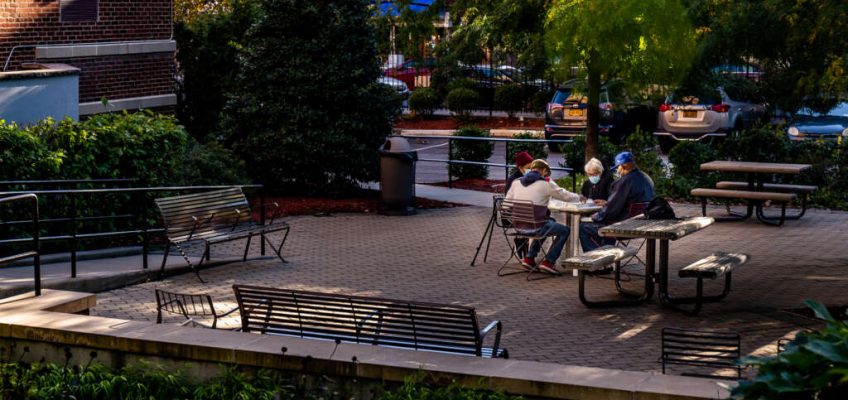“In the face of shrinking resources and rising need, community care might be the most powerful intervention we have.”
An early evening games of dominoes in the Bedford Park neighborhood of the Bronx. (Adi Talwar/City Limits)
In a city where therapists are overbooked, shelters are full, and crisis calls often end in handcuffs, “mental health awareness” rings hollow without action. This October for Mental Health Awareness Week, we need to rethink what care really looks like—and who has access to it. For many New Yorkers, especially in Black and brown communities, healing doesn’t begin with a diagnosis. It begins with community.
While city leaders continue to invest in clinical care and crisis response, the reality is that many people never make it that far. They’re uninsured, underpaid, or emotionally overwhelmed, but not “sick enough” to qualify for help. The woman who lives alone, without a child or spouse, battling depression while working a 9-to-5 and living paycheck to paycheck. The family who inherited a home but is one emergency away from losing it—quietly coping with anxiety but unable to take time off. Don’t they deserve care, too?
Just because your circumstances don’t fit the system’s definition of urgent doesn’t mean you don’t need support. And it shouldn’t mean you have to go without it. They don’t need a waitlist. They need support that’s close, culturally grounded, and consistent.
We’ve always known how to care for each other. We just stopped passing it down to the next generation. Learning how to reconnect the social media generation with in-person care is more urgent than ever. The activists of the past created systems off the grid—out of necessity, for survival. Fred Hampton once said, “Everything would be alright if everything was put back in the hands of the people, and we’re going to have to put it back in the hands of the people.”
What if we looked at mental health through that lens? What if we built living lists of therapists, coaches, and wellness practitioners who could support people regardless of their insurance? Mental health coaches like myself stand in the gap, offering care, accountability, and company on the road to restoration.
Mindfulness and meditation practitioners teach people how to breathe through the chaos—how valuable is that to a mom raising kids in the projects, a dad working two jobs, or a teenager being bullied at school? These are things the clinic can’t always offer. But the community can.
What if we funded healing circles and community walks on Saturday mornings for peace of mind, connection, and health? In the face of shrinking resources and rising need, community care might be the most powerful intervention we have.
This Mental Health Awareness Week (Oct. 5-11) we don’t need another campaign that doesn’t speak to us. We need care that actually reaches the unseen. The real work starts in how we show up for each other in how we listen, create space, and refuse to let people fall through the cracks. We need to support those already building healing spaces in church basements, living rooms, barbershops, and school gyms.
And we need to show up for people like Sonya Massey—a Black woman shot and killed by police in her own home after calling 911 for help. She struggled with paranoid schizophrenia. Maybe if someone from her block had checked in, if someone had sat beside her on the steps—she might still be here today. Her story unfolded in Illinois, but the warning it carries reaches every city, including our own.
Because care doesn’t always come with a clipboard. Sometimes, it shows up as a notebook, a deep breath, or a steady presence. If we’re serious about healing this city, we have to put care back in the hands of the people.
Kayla Thompson is a certified mental health coach, emotional wellness facilitator, and founder of Broken Hearts Restored, a nonprofit dedicated to making healing safe, accessible, and culturally grounded in the Black community. She leads community-based healing pop-ups, group coaching, and restorative letter-writing projects in NYC.
The post Opinion: Mental Health Awareness Should Start On Our Blocks appeared first on City Limits.


Leave a Reply